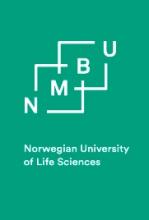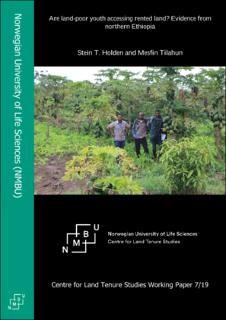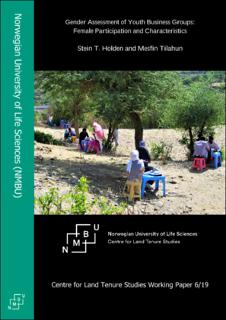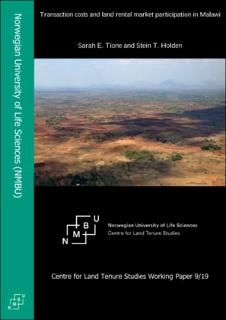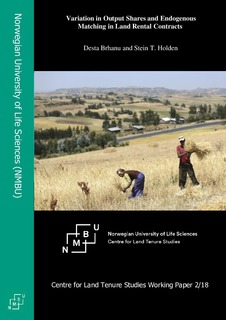Location
NMBU's mission is to contribute to the well-being of the planet. Our interdisciplinary research generates innovations in food, health, environmental protection, climate and sustainable use of natural resources.
About NMBU
NMBU's research is enabling people all over the world to tackle the big, global challenges regarding the environment, sustainable development, how to improve human and animal health, renewable energy sources, food production, and land- and resource management.
Members:
Resources
Displaying 6 - 10 of 98Are land-poor youth accessing rented land? : evidence from northern Ethiopia
Continued strong population growth in already densely populated rural areas in parts of Sub-Saharan Africa makes it harder for youth to choose agriculture as their main source of income. We investigate whether near landless youth still can access rented land as a complementary source of income. We utilize a unique data of rural youth that have been allocated rehabilitated communal land to form formalized business groups for joint business activity. They rely on complementary sources of income and land renting is one of these.
Gender assessment of youth business groups : female participation and characteristics
This working paper is an output from the research project “Youth Business Groups for Sustainable Development: Lessons from the Ethiopian Model” that is funded by Research Council of Norway under the NORGLOBAL2 research program for the period 2019-2022. This working paper provides updated and extended information on the gender differences among group members and how these are related to likelihood of becoming group board members and leaders.
Urban proximity, demand for land and land prices in Malawi
We assess the spatial and intertemporal change patterns of farmland prices using per hectare minimum willingness to accept (WTA) sales and rental prices in Malawi. We use three rounds of nationally representative household farm panel data from the Living Standards Measurement Surveys (LSMS), collected in 2010, 2013 and 2016. We study price changes by splitting the sample in quintiles based on distance from the nearest major city, building on the von Thünen theory and urban growth model. Generally, WTA land prices decrease with distance from urban areas.
Transaction costs and land rental market participation in Malawi
We assess the extent of access and degree of participation by smallholder tenants in the land rental market in Malawi. Our study is based on three rounds of nationally representative Living Standards Measurement Surveys collected in 2010, 2013 and 2016, from which we construct a balanced panel. We apply the transaction cost theory, which suggests transaction costs to be non-linear and depend on resource as well as socioeconomic characteristics within the customary tenure system that determines who hold, use and transfer land.
Variation in output shares and endogenous matching in land rental contracts
We investigate the extent of variation in output sharing in land rental contracts and alternative hypotheses to explain this variation. Close to half of the rental contracts in our study in northern Ethiopia have output shares that deviate from the dominant 50-50 equal sharing. Variation in land quality, the relative bargaining power of landlords and tenants, production risks and shocks are hypothesized to influence output shares. Matched data of landlords and tenants are used.

